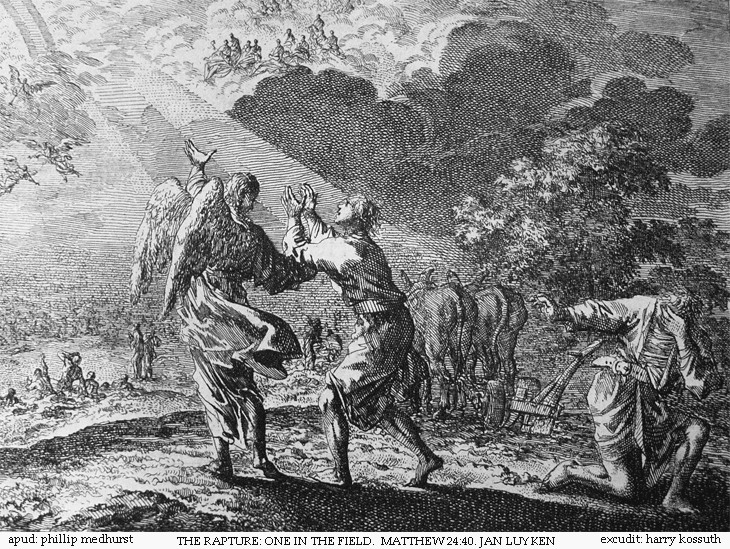|
Tribulation
In Christian eschatology, the Great Tribulation () is a period mentioned by Jesus in the Olivet Discourse as a sign that would occur in the time of the end. At , "the Great Tribulation" () is used to indicate the period spoken of by Jesus. uses ''tribulation'' (θλίβω) in a context denoting afflictions of those hard-pressed by siege and the calamities of war. Etymology The term "Great Tribulation" occurs four times in the New Testament: , , , and . Some take the words of Jesus in Matthew 24:21 to be describing a period of intense persecution and tribulation at the end of the age, prior to Jesus's return. Views Christians disagree over whether the Tribulation will be a relatively short period of great hardship before the end of the world and Second Coming of Christ (a school of thought sometimes called "Futurism"); or has already occurred, having happened in AD 70 when Roman legions laid siege to Jerusalem and destroyed its temple (sometimes called Preterism); or bega ... [...More Info...] [...Related Items...] OR: [Wikipedia] [Google] [Baidu] [Amazon] |
Olivet Discourse
The Olivet Discourse or Olivet prophecy is a biblical passage found in the Synoptic Gospels in Matthew 24 and 25, Mark 13, and Luke 21. It is also known as the Little Apocalypse because it includes the use of apocalyptic language, and it includes Jesus's warning to his followers that they will suffer tribulation and persecution before the ultimate triumph of the Kingdom of God. The Olivet discourse is the last of the Five Discourses of Matthew and occurs just before the narrative of Jesus's passion beginning with the anointing of Jesus. In all three synoptic Gospels this episode includes the Parable of the Budding Fig Tree. It is unclear whether the tribulation Jesus describes is a now past, present, or future event. Preterists believe the passage largely refers to events surrounding the destruction of the Temple in Jerusalem and as such is used to date the Gospel of Mark around the year 70. Futurists believe the prophecy is broken into different parts, and partly � ... [...More Info...] [...Related Items...] OR: [Wikipedia] [Google] [Baidu] [Amazon] |
Post Tribulation Rapture
The posttribulation rapture doctrine is the belief in a combined resurrection and rapture, or gathering of the saints, that occurs after the Great Tribulation but before the millennial reign of Christ. It differs from other rapture views such as pretribulation, midtribulation, and prewrath. There are four variants of this view: classic, semiclassic, futurist, and dispensational. It may be a premillennial, postmillennial, or amillennial view. Doctrine The posttribulation rapture doctrine is an eschatological concept which relates the rapture of the Church, which refers to Christ gathering the saints prior to his return, to the tribulation, which refers to a time of trouble and suffering, and Christ's Second Coming. The definition is one of timing, with posttribulationism placing the timing of the rapture at the end of the tribulation period. The rapture of the saints and the Second Coming are a single event. This is in contrast with the two-stage pretribulation rapture v ... [...More Info...] [...Related Items...] OR: [Wikipedia] [Google] [Baidu] [Amazon] |
Christian Eschatology
Christian eschatology is a minor branch of study within Christian theology which deals with the doctrine of the "last things", especially the Second Coming of Christ, or Parousia. The word eschatology derives from two Greek roots meaning "last" () and "study" (-) – involves the study of "end things", whether of the end of an individual life, of the end of the age, of the end of the Worldly, world, or of the nature of the Kingdom of God (Christianity), Kingdom of God. Broadly speaking, Christian eschatology focuses on the ultimate destiny of individual souls and of the entire Genesis creation narrative, created order, based primarily upon Bible, biblical texts within the Old Testament, Old and New Testaments. Christian eschatology looks to study and discuss matters such as death and the afterlife, Heaven in Christianity, Heaven and Hell in Christianity, Hell, the Second Coming of Jesus, the resurrection of the dead, the rapture, the tribulation, millennialism, the Eschatology, ... [...More Info...] [...Related Items...] OR: [Wikipedia] [Google] [Baidu] [Amazon] |
Midtribulationism
The Rapture is an eschatological position held by some Christians, particularly those of American evangelicalism, consisting of an end-time event when all dead Christian believers will be resurrected and, joined with Christians who are still alive, together will rise "in the clouds, to meet the Lord in the air." This view of eschatology is typically part of dispensational premillennialism, a form of futurism that considers various prophecies in the Bible as remaining unfulfilled and occurring in the future. The idea of a rapture as it is defined in dispensational premillennialism is not found in historic Christianity and is a relatively recent doctrine originating from the 1830s. The term is used frequently among fundamentalist theologians in the United States. The origin of the term extends from the First Epistle to the Thessalonians in the Bible, which uses the Greek word (), meaning "to snatch away" or "to seize". Differing viewpoints exist about the exact time of the ra ... [...More Info...] [...Related Items...] OR: [Wikipedia] [Google] [Baidu] [Amazon] |
Rapture
The Rapture is an Christian eschatology, eschatological position held by some Christians, particularly those of American evangelicalism, consisting of an end-time event when all dead Christian believers will be resurrected and, joined with Christians who are still alive, together will rise "in the clouds, to meet the Lord in the air." This view of eschatology is typically part of dispensational premillennialism, a form of Futurism (Christianity), futurism that considers various prophecies in the Bible as remaining unfulfilled and occurring in the future. The idea of a rapture as it is defined in dispensational premillennialism is not found in historic Christianity and is a relatively recent doctrine originating from the 1830s. The term is used frequently among fundamentalist theologians in the United States. The origin of the term extends from the First Epistle to the Thessalonians in the Bible, which uses the Greek word (), meaning "to snatch away" or "to seize". Differing ... [...More Info...] [...Related Items...] OR: [Wikipedia] [Google] [Baidu] [Amazon] |
Eschatology
Eschatology (; ) concerns expectations of the end of Contemporary era, present age, human history, or the world itself. The end of the world or end times is predicted by several world religions (both Abrahamic religions, Abrahamic and non-Abrahamic), which teach that negative world events will reach a climax. Briefly: the eschaton is the all-inclusive term evoking this predicted climax of a particular theological or political worldview. The scope of expected consequence is global and not local. Eschatology denotes the theory, discussion, techniques, behaviors and orientation toward the eschaton. Theories of afterlife may also be a dimension of eschatology in certain contexts—in these contexts the afterlife of an individual is a kind of hologram or particular microcosm of the overall eschaton. The Eschaton is, furthermore, related to telos: a Greek word simultaneously denoting purpose, climax and end (ie. death, terminus etc. but also perfection, completion etc.). Eschaton is t ... [...More Info...] [...Related Items...] OR: [Wikipedia] [Google] [Baidu] [Amazon] |
Futurism (Christianity)
Futurism is a Christian eschatological view that interprets portions of the Book of Revelation and other apocalyptic sections of the Bible as future "end-time" events. By comparison, other Christian eschatological views interpret these passages as past events in a symbolic, historic context, such as preterism and historicism, or as present-day events in a non-literal and spiritual context, as in idealism. Futurist beliefs usually have a close association with premillennialism and dispensationalism. Historic premillennialism combines futurist and preterist views. Background The term futurism refers to the fact that this view pushes prophecies in the apocalyptic sections of the Bible into a future "end time" occurrence. The futurist approach to the Book of Revelation contends that chapters 4-22 relate to a future time. The alternatives to futurism are preterism, both full and partial, which views prophetic fulfillment as already having happened in the past; historicism, ... [...More Info...] [...Related Items...] OR: [Wikipedia] [Google] [Baidu] [Amazon] |
Preterism
Preterism is a Christian eschatological view or belief that interprets some (partial preterism) or all (full preterism) prophecies of the Bible as events which have already been fulfilled in history. This school of thought interprets the Book of Daniel as referring to events that happened from the seventh century BC until the first century AD, while seeing the prophecies of the Book of Revelation, as well as Christ's predictions within the Olivet Discourse, as events that happened in the first century AD. Preterism holds that Ancient Israel finds its continuation or fulfillment in the Christian church at the destruction of Jerusalem in AD 70. The term ''preterism'' comes from the Latin , which is a prefix denoting that something is or . Adherents of preterism are known as preterists. Preterism teaches that either all (full preterism) or a majority (partial preterism) of the Olivet Discourse had come to pass by AD 70. Historically, preterists and non-preterists have generall ... [...More Info...] [...Related Items...] OR: [Wikipedia] [Google] [Baidu] [Amazon] |
Historicism (Christianity)
In Christian eschatology, historicism is a method of interpretation of Biblical prophecy, biblical prophecies which associates symbols with historical persons, nations or events. The main primary texts of interest to Christian historicists include apocalyptic literature, such as the Book of Daniel and the Book of Revelation. It sees the prophecy, prophecies of Daniel as being fulfilled throughout history, extending from the past through the present to the future. It is sometimes called the continuous historical view. Commentators have also applied historicist methods to ancient Jewish history, to the Roman Empire, to Islam, to the History of the papacy, Papacy, to the Modern era, and to the Eschatology, end time. The historicist method starts with Daniel 2 and works progressively through consecutive prophecies of the book—chapters Daniel 7, 7, Daniel 8, 8 and Daniel 11, 11—resulting in a view of Daniel's prophecies very different from preterism and Futurism (Christianity), futu ... [...More Info...] [...Related Items...] OR: [Wikipedia] [Google] [Baidu] [Amazon] |
Dispensationalism
Dispensationalism is a Christian theology, theological framework for Biblical hermeneutics, interpreting the Bible which maintains that history is divided into multiple ages called "dispensations" in which God the Father, God interacts with his chosen people in different ways. It is often distinguished from covenant theology. These are two competing frameworks of biblical theology that attempt to explain overall continuity in the Bible. Coining of the term "dispensationalism" has been attributed to Philip Mauro, a critic of the system's teachings, in his 1928 book ''The Gospel of the Kingdom''. Dispensationalists use a Biblical literalism, literal interpretation of the Bible and believe that divine revelation unfolds throughout the Bible. They believe that there is a distinction between Twelve Tribes of Israel, Israel and the Christian Church, Church, and that Christians are not bound by Law of Moses, Mosaic law. They maintain beliefs in premillennialism, Christian Zionism, an ... [...More Info...] [...Related Items...] OR: [Wikipedia] [Google] [Baidu] [Amazon] |




